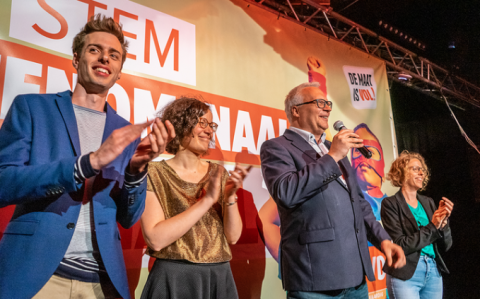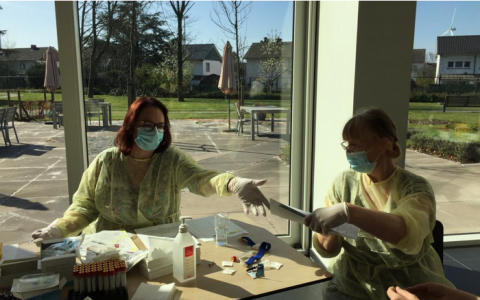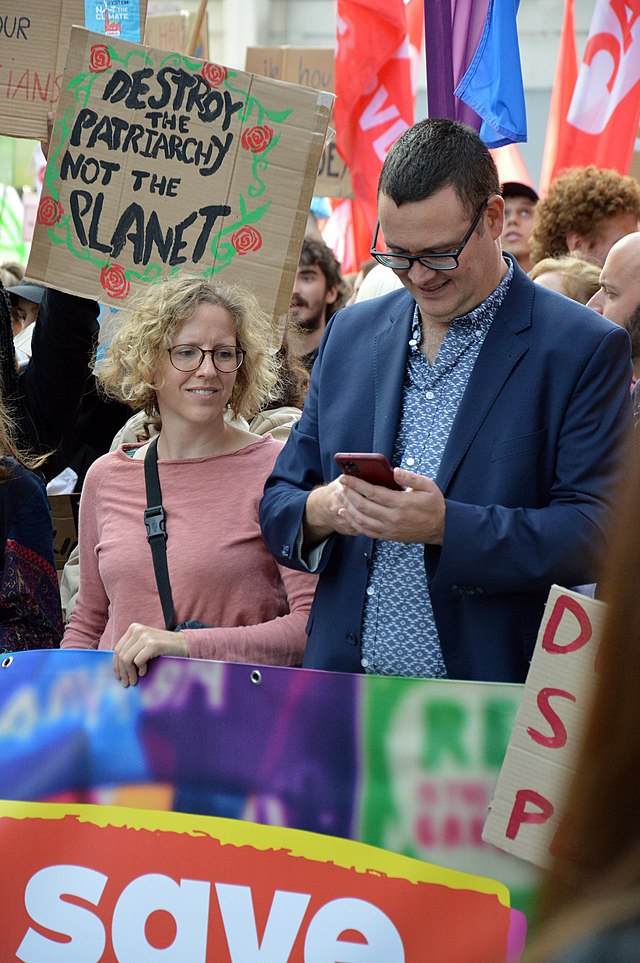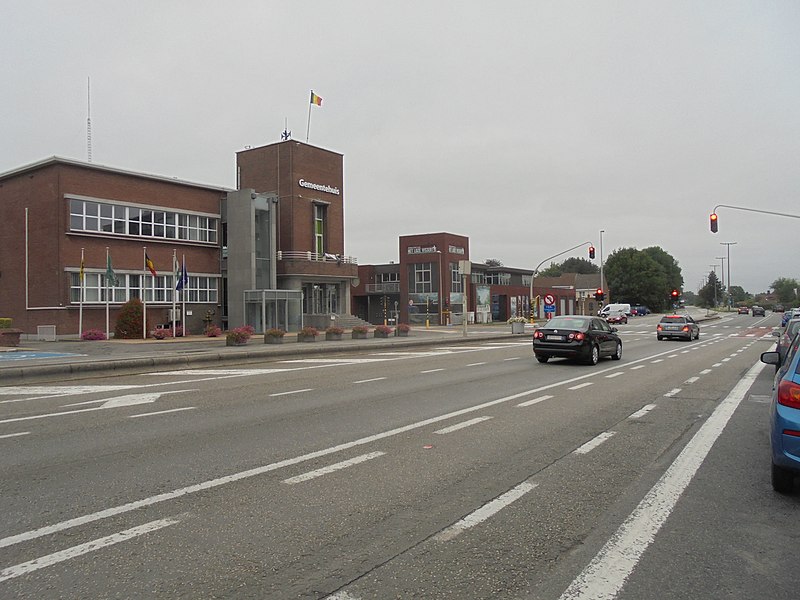One big story dominated coverage of the 2019 Belgian elections: the fascist Vlaams Belang (Flemish Importance) was back as a relevant party, taking just over 19% of the Flemish vote, thus increasing their seat count in the federal parliament by 15 to a grand total of 18 (out of 150 total). This sadly overshadowed the second big winner of the night, the radical left wing Workers’ Party of Belgium (PTB), which achieved their best electoral result ever and finally achieved their electoral breakthrough in Flanders.
After returning their first ever two MPs to parliament in 2014 (both coming from the French speaking region of Wallonia) and a strong showing in the 2018 local elections, one of the main goals of the Workers’ Party was finally clearing the electoral threshold in Flanders. And they succeeded. The party’s seat count went from two to twelve, returning MPs from all regions of the country for the first time. In addition, they gained representation in all regional parliaments (Flanders, Brussels, Wallonia) and gained one European MP with Marc Botenga. In total, the party captured 8.6% of the national vote.

L’Union Fait La Force
One of the peculiarities of the Belgian political system is it’s division along language lines. In the 1970’s, all existing major parties split into a Flemish (Dutch speaking) and Walloon (French speaking) party. This resulted in a fragmented political landscape, with 12 parties represented in parliament today. Currently, the Workers’ Party is the only unitary party with parliamentary representation, competing in elections on both sides of the language barrier, providing an important counterweight to the growing right wing separatism in Flanders.
This does not just translate to electoral politics. When french-speaking Belgium was hit by heavy flooding in July resulting in 41 deaths, the party organized SolidariTeams, sending buses filled with volunteers, as well as collecting much needed supplies for the affected area and providing warm food for those who lost electricity and gas. Large amounts of this help came from Flanders, and together with other similar initiatives and volunteers, they continue to this day to help with the cleanup. Meanwhile in parliament, they continue to call for more aid for the victims, many of which still live in damp, mold ridden homes. Meanwhile they continue to argue for a radical and ambitious climate policy.

Medicine For The People
It’s almost impossible not to mention healthcare during a global pandemic. Since 1971, the PTB has been running a network of healthcare centers, called Medicine for the People, offering free medical care at the point of use. In addition, they lead the charge in campaigns for cheaper medicine and against industrial pollution, having cut their teeth in 1970’s during the fight against lead poisoning caused by mining giant Union Minière (now Umicore) in the town of Hoboken.
When Covid-19 hit in February 2020, Medicine for the People helped organize mass testing, distributed facemasks and set up an effective contract tracing network at a local level, at a time when the government failed to effectively organize this themselves. In addition, they started campaigning for lifting the patents on vaccines, stricter sanctions for companies not complying with home office rules and for more funds towards the healthcare sector.

Medicine for the People is a prime example of the philosophy of the PTB to carry the reality in the streets into parliament, building organizations to listen to and help people in a local manner while fighting for structural change at the top. Quite a few doctors now hold seats in parliament or local councils for the party, with one, Sofie Mercx, recently becoming the leader of the party’s federal parliamentary group.
Currently, there are 11 of these healthcare centers throughout the country, all situated in working class neighborhoods. Together with so-called ‘Base Groups’ that operate at a very local level in which members can participate, as well as through their youth organizations COMAC and RedFox, these initiatives provide a way to listen to people and adjust policy dynamically. Every September, the party organizes a music/political festival called ‘ManiFiesta’, in which all these party organizations participate. But it’s not just party run organizations that have stands there: unions and civilian initiatives (like Hart Boven Hard, founded against the austerity measures of the previous government) also participate and have stands at the festival.
An Effective Opposition
As of October 2020, after a government formation that lasted 493 days, Belgium is governed by a broad centrist coalition of no less than seven parties, including liberals, social democrats, greens and Christian democrats. From the right, the two Flemish separatist parties (one fascist, one slightly more ‘moderate’), try to delegitimize the government, claiming it is undemocratic because it doesn’t have a majority in Flanders. On the left, the PTB forms the opposition.
Despite being in opposition, the PTB has managed to secure some notable victories. In 2019, the party campaigned heavily for a minimum pension of 1500 euros/month, bringing it to the center of the political debate. Other parties, including the Christian democrats and the even right wing liberals, quickly started adopting the proposal in their platforms. In addition, the party launched a successful petition to bring the proposal forward in parliament through a “citizen’s law”. And while parliament rejected it, the new government formed in the next year pledged to increase the minimum pensions, although more modestly.
In late 2019, while the government formation was still ongoing and parliament had to enact an emergency budget to prevent a US-style government shutdown, the PTB staged an upset and managed to push through an amendment of 67 million Euros in additional funds for the healthcare sector. This is estimated to have created 4.500 new jobs, which proved very valuable in the fight against the pandemic.
Very recently, amidst surging energy prices, the party relaunched an issue they have been campaigning for since 2007, namely to reduce the VAT on energy and gas from 21% (the same level as caviar and champagne) to 6%. Despite rejecting the proposal in September, the Christian Democrat minister of finance backed it as a possible solution in January. Soon, other parties followed in their support, with some putting forward alternative measures to lower energy prices. A few weeks ago, the government announced that they would be reducing VAT on electricity (temporarily, only for 4 months in spring), but unfortunately not for gas. While the measures the government took are laughable at best, and the PTB has fiercely criticized them as insufficient, they do show that the debate is at least shifting. The party has vowed to keep up the pressure and is organizing a protest march at the end of February.
Overall, on a number of issues, the Workers’ Party has managed to pull the debate to the left, fiercely attacking neoliberal policies and putting pressure on other left wing parties to hold true to their principles. The Walloon Socialist Party (PS) is especially wary of strong PTB polling in the south of the country. Especially worrying is the growing influence of the party in the labor movement, especially in the PS aligned socialist union FGTB.
New President, Same Direction
In December 2021, Peter Mertens, party president since 2008, did not seek reelection for another term as PTB president and was succeeded by then spokesperson and leader of the parliamentary party Raoul Hedebouw.

Mertens left the role of president while the party is polling at an all time high. He was the one that reformed the party from one that was dogmatic and sectarian into the dynamic 21st century Marxist party that it is today, resulting in electoral success. He still remains very much involved with the party, taking up the position as general secretary. The main reason cited for taking a step back was to focus more on broader policy lines, spending more time on writing and not wanting to deal with the squabbles of day to day politics anymore.
Hailing from Wallonia, Raoul Hedebouw has set forward a course very similar to that of Mertens, with an additional focus on giving workers and the youth a bigger place within the party (currently, four out of 12 PTB MPs are workers). Hedebouw is perfectly bilingual and his parliamentary interventions, in which he switches from Dutch to French constantly, are widely shared across social media.
Towards 2024
One of the main criticisms aimed at the party by the other parties on the left is that it would be unwilling to compromise and prefers opposition over government. The PTB’s stance has always been that it is more than willing to negotiate, provided red lines aren’t crossed. When pressed recently on television on what these red lines are, Raoul Hedebouw said they include reducing the pension age back to 65 as well as reducing the VAT on energy and not splitting up the country more. In addition, he mentioned that while compromises will have to be made and that one can’t implement their entire program, principles can’t be thrown out of the window just for the sake of governing. He also spoke against working with Flemish separatists and liberals, and that alliances will have to be found within the left.
On multiple occasions, especially in the Flemish regional parliament where the greens and social democrats are also in opposition, the three parties of the left have collaborated against the right wing government. In 2019 however, coalition talks for a PS (social democrat), Ecolo (greens) and the PTB for the Walloon regional government broke down, after the PTB claimed that the PS was not willing to fundamentally change things. In Wallonia, there have also been several attempts at forming local coalitions between the PS and PTB, but all of these talks broke down. Most notably in cities like Liege, where one of the main reasons cited by the PTB was the lack of new investments in social housing and public services. Meanwhile the PS claimed the PTB program couldn’t be paid for and that the party wanted “to revolt against higher levels of government”. Thus, talks broke down, despite calls by the influential socialist union FGTB for a left wing coalition.
Currently in Flanders, on a local level, the PTB is participating in a red red green coalition in Borgerhout (a district of Antwerp) and as a junior coalition partner to the social democrats in the small industrial town of Zelzate. Cooperation appears to have yielded positive results, with the coalition increasing taxes on big industry while reducing them for small businesses, as well as investing more funds into fighting poverty.

If current polling holds, the party would win 19 seats (increasing their total by seven), overtaking the Greens for the first time in Flanders and approaching the 20% mark in Wallonia. This would make them the third party in parliament. However, the elections are only set for 2024 (provided the government doesn’t collapse) and a lot can happen before then. More worrying is the fascist VB polling at nearly 25% in Flanders and becoming the biggest party in the federal parliament. In addition, they might be able to acquire a majority together with the N-VA (New Flemish Alliance, more moderate right wing separatists), which could see the cordon sanitaire broken for the first time.
To do so, the PTB has been focusing on exposing the hypocrisies of the VB, who claim to be a social party that listens to the concerns of common people. On many occasions, VB has voted against the policies that they claim to support, like when they voted against a PTB proposal to reduce the wages of deputies and they voted against raising the minimum wage. While of course strongly condemning the racism and punch down attitude of the VB, the PTB wants to reach out to VB voters and listen to their concerns about social issues, not demonize them simply as racist and backwards. PTB social media ads target VB voters frequently. The party sees it as their goal to bring back VB voters to the left, after many abandoned the traditional parties over the past few decades.
2024 will see elections for all levels of government, from local to European. Covid-19 has painfully highlighted the weaknesses within the Belgian political system and showed the failures of the decades of decentralization to the regions. With challenges like climate change looming ahead (highlighted by the disastrous floods of the summer), Belgium needs unity more than ever. Far right separatism doesn’t provide an answer to these problems. As the only unitary party, the Workers’ Party of Belgium could and has to play in countering VB’s separatism and racism with a social, inclusive and authentic left wing vision in 2024.
